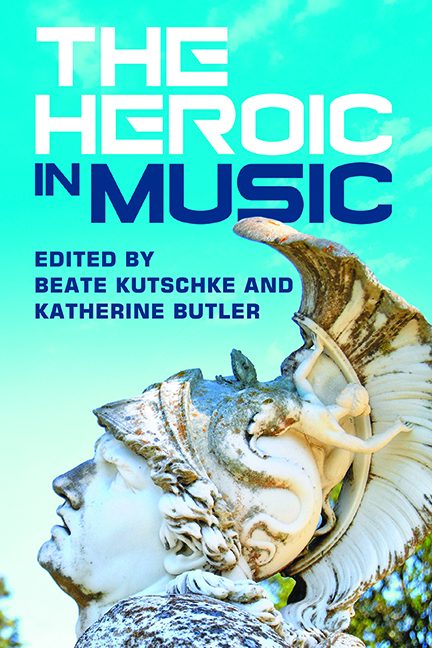Book contents
- Frontmatter
- Contents
- List of Illustrations
- Notes on Contributors
- Introduction
- Part I The Configuration of Heroic Music as a Tool for Shaping Moral and Political Identity
- Part II Music, its Ethics and Politics – Beyond ‘Beethoven Hero’
- Part III Heroic Music and its Moralities in Dictatorships and Post-Heroic Democracies
- Bibliography
- Index
Introduction
Published online by Cambridge University Press: 16 July 2022
- Frontmatter
- Contents
- List of Illustrations
- Notes on Contributors
- Introduction
- Part I The Configuration of Heroic Music as a Tool for Shaping Moral and Political Identity
- Part II Music, its Ethics and Politics – Beyond ‘Beethoven Hero’
- Part III Heroic Music and its Moralities in Dictatorships and Post-Heroic Democracies
- Bibliography
- Index
Summary
A Concept with an Imperative, but no Content
In current scholarship and everyday discourse, heroism is a sensitive, ambiguous topic. On the one hand – and primarily on the eastern side of the Atlantic Ocean – heroes and heroines have become dubious in light of the ubiquity of the heroic jargon of various twentieth-century dictatorships. As a consequence, hero-worshipping has only subliminally survived in niches of European societies: TV shows praise everyday heroes and heroines who rescue cats from roofs, pop bands label themselves heroes, intellectuals proclaim the post-heroic era, and computer games and epic films feature heroic figures.
On the other hand – and on both sides of the Atlantic Ocean – it is undisputed that heroes and heroines, living, dead and fictional, have always played a significant role in human societies, especially as moral and political role models. Moreover, there are also recent trends in medicine and psychology, that draw on past heroic discourses in order to propagate heroic capacities in the present. Labelling their activities as ‘heroism science’ to be investigated in the framework of blog posts, publications and biennial conferences, these agents claim that every individual is supposed to possess heroic capacities, which serve as universal means for self-engineering and personal success, and as a world-healing remedy.
What are these heroic capacities and qualities that stimulate individuals to call other individuals heroic? It is essential to the concept of the heroic that what is considered heroic varies greatly depending on the speakers and the contexts in which they use the term. When speakers use the terms ‘hero’, ‘heroine’, or ‘heroic’, they are not referring to a particular, intersubjectively consistent set of qualities, but are primarily articulating their admiration for the specific behaviours and qualities of those individuals to whom they refer. That is, by calling individuals or their behaviour heroic, they upgrade them and, simultaneously, create, through purely linguistic means, the phenomenon to which they refer with the label ‘heroic’. Additionally, attributing such high values to selected characteristics (by means of the label ‘heroic’), the speakers implicitly suggest or even demand that the heroes or heroines’ examples be followed. In this way, individuals who have been labelled heroes and heroines function as paradigms for moral imperatives in society.
- Type
- Chapter
- Information
- The Heroic in Music , pp. 1 - 10Publisher: Boydell & BrewerPrint publication year: 2022

